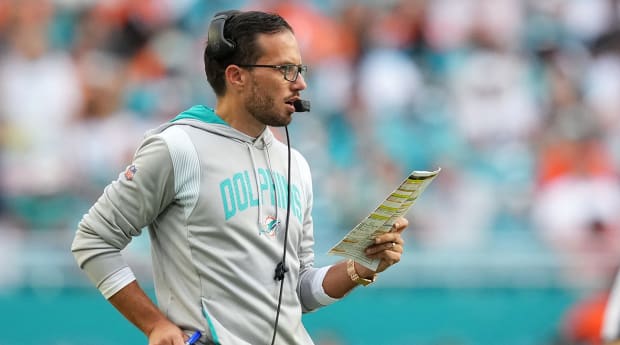Welcome to Bad Takes Week, where MMQB staffers have been asked to expand upon some of their worst football takes. Keep an eye out for more of these throughout the week, and every story is posted here.
The Rams were playing the Chargers or Texans. The opponent doesn’t matter because it was an easy-to-forget preseason game last summer, but I do remember watching the broadcast thinking how great it was to hear Sean McVay analyze the plays called by his assistant coaches and how we need more of this.
And before you get too far ahead, we don’t need head coaches doing TV analysis during snaps in the regular season. (Perhaps that could be good for Bad Takes Week next year.) Also, that probably isn’t even an option for most head coaches because about 20 of them are expected to call either offensive or defensive plays during the 2023 season. That’s more than half the league, and head coaches already have a lot on their plates. See where I’m going with this?
What we need more of is head coaches giving play-calling duties to their assistant coaches, and not just in forgetful preseason games. But most head coaches are control freaks, so let’s make this mandatory: NFL head coaches shouldn’t be allowed to call plays in regular-season games. There, I said it.
Perhaps head coaches can have the option of calling plays in the postseason, but more on the system later. And it might be one with flaws, but is also probably better than the league’s poor approach to improving diversity among head coaches and play-calling coordinators, especially on the offensive side.
Let’s be real for a second. The best path for landing a head coaching gig nowadays is by calling offensive plays. But that’s tough to do with McVay, Kyle Shanahan, Arthur Smith, Kevin O’Connell, Matt LaFleur, Mike McDaniel, Zac Taylor, Kevin Stefanski, Josh McDaniels, Mike McCarthy, Doug Pederson, Shane Steichen, Sean Payton and Andy Reid hogging the responsibility for their respective teams. And there’s not much diversity among this list of names, by the way.
Frank Reich should probably be on the list, but he told reporters that “at some point” during his first season in Carolina he’s going to pass down offensive play-calling duties to offensive coordinator Thomas Brown. Reich is a perfect example of why it’s difficult for most head coaches to relinquish play-calling responsibilities. As the Colts’ head coach, Reich had a tough time juggling the responsibility of being the offensive play-caller and overseeing various other areas of the team during his tumultuous five-year stint in Indianapolis. But that only made him consider the idea of not calling plays in Carolina.
Watch the NFL with fuboTV. Start your free trial today.

Jasen Vinlove/USA TODAY Sports
I understand most head coaches are terrific play-callers, but I bet many would find assistant coaches who are just as capable, if not better, by giving them opportunities to call games that matter. Having reliable assistant coaches and coordinators who can call plays has many benefits for head coaches. Just ask Nick Sirianni, who gave up offensive play-calling duties to Steichen during his first season in Philadelphia. The results speak for themselves, with a late-season push to the playoffs that first year and then a trip to the Super Bowl in Sirianni’s second season—and Steichen’s landing a head coaching gig with the Colts after he designed a productive offense for quarterback Jalen Hurts.
Brian Daboll is another good example. He was hired by the Giants mainly because of his results as the Bills’ offensive play-caller, but he had Mike Kafka call plays in New York, while Daboll guided the Giants to the postseason and won NFL Coach of the Year during his first season as a head coach.
Robert Saleh made a name for himself as the 49ers’ defensive play-caller, but he hasn’t called plays for the Jets since being hired as the head coach in 2021. The Jets ascended as one of the best defensive units in the league last season. Just because Saleh, Daboll and Sirianni aren’t calling plays doesn’t mean they can’t help install an offense or defense during the week.
If you have read this far, you have hopefully at least warmed up to this proposal. So here’s what I’m thinking for the system, which prioritizes increasing coaching hires for minority candidates.
1) Head coaches pick eight coaches from their staff—four on offense and four on defense—and have them rotate as play-callers every four games.
2) For the 17th game, the head coach can pick the two coaches they deem as the best play-callers on the staff; one on offense and one on defense. These coaches can also be the full-time play-callers in the playoffs.
I’m not married to this system, but I do like how it creates more opportunities for coaches, which is the goal for this proposal. And yes, it shouldn’t be this complicated, but clearly what the league has done hasn’t provided many results.
For a simpler approach, you could say head coaches shouldn’t be allowed to call plays during their first season with a new team. Similar to how investor home buyers are required to live in the new property for at least a year before being allowed to rent it out to qualify for the 3.5% down payment. (It’s not easy buying a house in California, and I’ve been listening to the BiggerPockets podcast a lot lately.)
It’s also not easy to land a head coaching job in the NFL. Want the gig? Give up play-calling for a year. This seems fair, at least to me, and there are many benefits even if this is being run during Bad Takes Week. Think about it.







